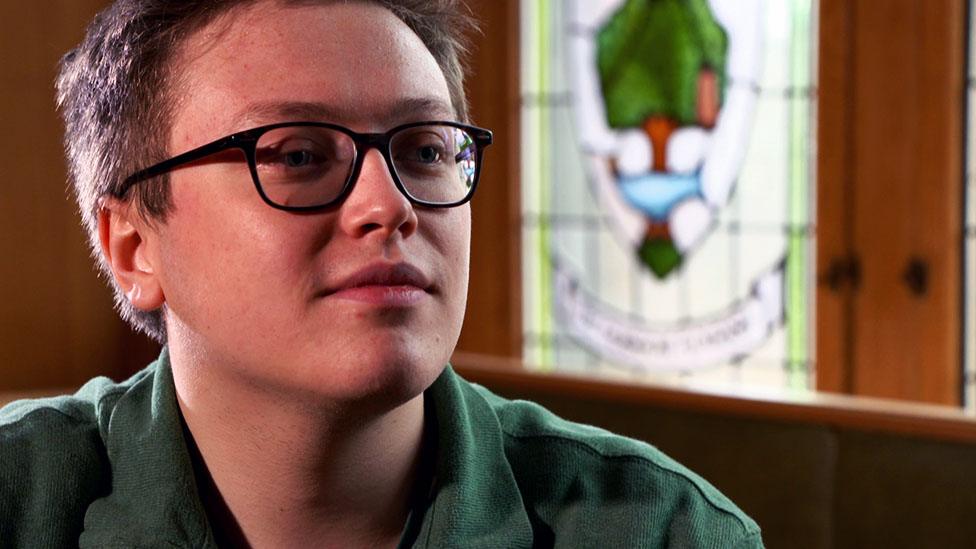Coronavirus: Students with no relatives 'may have to drop out'
- Published

Hundreds of students previously in care or estranged from their families may be forced to drop out of university due to coronavirus, a charity has said.
The Unite Foundation said work had dried up because of Covid-19 and these students can neither move home nor rely on the "bank of mum and dad".
It wants an emergency grant in Wales and England like that in Scotland, external.
The Welsh Government said it provided the UK's "most generous student support package".
The UK government said it had made £23m available for June and July for student hardship funds.
Some 340 students in Wales - and about 8,000 in the UK - were estranged from their parents and relatives, according to figures released by the Student Loans Company in December.
The reasons for estrangement are varied and can often be complicated - including abusive families, clashes of values, and teenagers not being accepted for their sexuality among the most common.
Research has previously suggested estranged and care-experienced students are more likely to drop out of their studies and coronavirus has only exacerbated things, according to Eluned Parrott, director of the Unite Foundation.
"When everyone packed up and left campuses, some people couldn't go home because they haven't got a home to go to.
"Generally speaking, most of the places where students are most likely to be employed are closed. So it's a bit of a pincer movement.
"Not only do they not have the family capital to rely on, that new 'family' at university has disappeared and there's really very few other places for them to turn to."
Research has shown only six per cent of care leavers aged 19-21, external go into higher education, and those who do are nearly twice as likely to drop out than their peers.

'You are by yourself'
Stacey Watson: "How am I going to afford to do my food shop... if I can't go to work?"
Stacey Watson, 20, went into foster care when she was 12. She was later helped into higher education by Swansea and Neath Port Talbot care-leavers' social enterprise, FABRIC.
She has been studying maternity care at Swansea University, while working in sales and education support to pay her way through her studies.
Stacey has been able to continue working through most of the pandemic and she said she did not know how she would have otherwise survived.
"Not having the family support, you can't see anyone, you can't do anything and you are by yourself.
"And it's even more difficult then to know you don't have anyone, bar your friends, but it's not the same, it's not your own family.
"Yes, you have time to do your studies but it's like, how am I going to afford to do my food shop this week or next week if I can't go to work and get that funding?"
Stacey said it was "extremely difficult" to study with no family help and there was "not enough" extra funding for people in her position.
She is hoping to study a further course in social work and her dream is to open a residential facility for care-leavers who also hope to study at university.

Ms Parrott said some in this position had been forced to sofa-surf or to "max-out" their credit card.
"We're at the point in time where young people are telling us that the only alternative they have to taking on debt is to drop out of university."
She said hardship funds offered by universities, which typically give out a one-off payment of a few hundred pounds, were just a "drop in the ocean".
She called for Wales to "learn from Scotland" by introducing a £105 weekly accommodation grant for care-experienced students and to extend this scheme to estranged students too.
Survey of 251 care-experienced and estranged students at the start of lockdown
62%said money was their main concern
50%said they were concerned about getting food and essentials
A Welsh Government spokeswoman said: "In Wales, we provide the most generous student support package in the UK, and the only country in the whole of Europe that provides equivalent up-front living-costs grants and loans for full and part-time undergraduates, and post-graduates."
They added care-leavers were entitled to the maximum maintenance grant, irrespective of their household income.
"We've provided the full non-repayable grant worth up to £10,124 to care leavers since 2018, ensuring they are fully supported while studying," they added.
A spokeswoman for the UK Department for Education said they understood it was an "extremely difficult time for students, especially for those who do not have a support network around them".
"To help those most in need, we have worked with the Office for Students to help universities use an existing £23m per month for June and July towards student hardship funds," they added.
- Published1 June 2019

- Published17 December 2019

- Published16 January 2020

- Published11 May 2020
